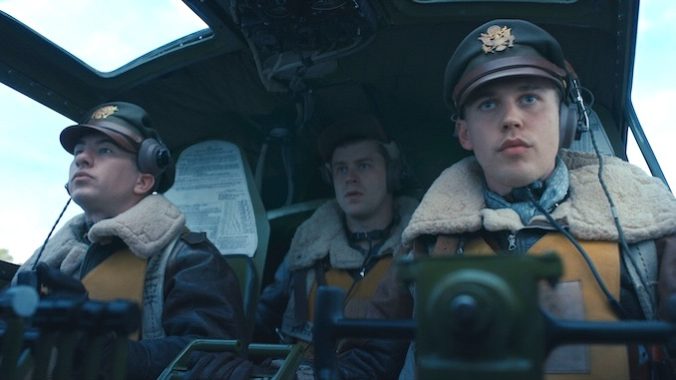From Band of Brothers to Masters of the Air, Our Changed TV Landscape Couldn’t Be More Apparent
Photo Courtesy of Apple TV+
To fully grasp a show like Band of Brothers, we have to try our best to put ourselves back in 2001, when it first premiered. This was before the streaming wars, before the likes of Apple TV+, Prime Video, and Netflix, before the biggest and brightest stars moved seamlessly between the big screen and the small. This was back when it wasn’t TV, it was HBO, and they had somehow convinced Tom Hanks and Steven Spielberg to follow up their epic, Academy Award-winning film Saving Private Ryan with a similarly-ambitious War World II drama that would go on to cost a record-setting $200 million to produce. Band of Brothers was groundbreaking in so many ways, but perhaps most impressive is how well its legacy has stood the test of time. Over 20 years since it first premiered, Band of Brothers remains a totemic bit of television, the kind of the miniseries people return to, discover, and proselytize for, enthralled by its sheer magnitude, and horrified by its depiction of a war whose terror remains as transfixing as ever.
The series’ huge success assured that it would not remain a singular miniseries forever. It took nine years, but eventually HBO got (some of) the gang back together for The Pacific, an even gnarlier look at WWII, now told from the perspective of soldiers fighting the Japanese on islands throughout the Pacific. Now, over ten years later—and after a few stops and starts—we get the third installment in this odd-duck trilogy. Masters of the Air is an in-depth look at the Air Force unit known as the “Bloody Hundredth” and the toll such high-flying expeditions take on those tasked with bombing the Axis power during the second World War. It’s epic, star-studded, and one of the first truly massive television events of 2024. It is also, in ways both positive and negative, a perfect encapsulation of how things have shifted dramatically for television over the last 20 years.
By all appearances Masters of the Air closely follows the path laid down by its predecessors. All three series are based on nonfiction novels and first person accounts, aiming, it would seem, to remove the glossy, melodramatic sheen of some of Hollywood’s previous depictions of war—this one pulling from Donald L. Miller’s Masters of the Air: America’s Bomber Boys Who Fought the Air War Against Nazi Germany. Spielberg and Hanks are, once again, involved this time around, as are their production companies, Playtone and Amblin. Structurally, Masters of the Air follows the pattern laid out by Band of Brothers and The Pacific: beginning each episode with a dramatic intro set to its sweeping score before transitioning to stories broadly framed around specific missions enacted by our heroes. As you might have guessed, recreating the horrid, chaotic theater of war is no small undertaking. According to reports, each of the three series’ also have a budget eclipsing $200 million, making them all huge bets by their creators.
And yet, this might be the most illustrative in talking about what sets these series apart. It might sound obvious, but $200 million in 2001 and 2024 are two very different things and help illustrate how almost every single thing about what we call television has changed since 2001. As mentioned, Band of Brothers was an absolutely massive undertaking, a war epic stretched from a single feature film to something five times that size, and the most expensive miniseries of all time upon its release. This was unlike anything HBO had ever done and probably would not have gotten off the ground without the help of Hanks and Speilberg, perhaps the most powerful actor and director of the moment. That investment certainly paid off, with its first episode bringing in over 10 million viewers and becoming a genuine sensation. Jumping ahead over 20 years finds us in a very different place, a place where shows like Amazon Prime’s Lord Of The Rings: The Rings of Power and The Citadel come in at cost of $50 million an episode. This is, perhaps, one of the reasons you will not find Masters of the Air on HBO or Max this winter, but rather on Apple TV+, a streamer with deeper pockets willing to give creators a little more wiggle room. HBO might have set the standard back in 2001, but they are having a harder time keeping up in 2024.
-

-

-

-

-

-

-

-

-

-

-

-

-

-

-

-

-

-

-

-

-

-

-

-

-

-

-

-

-

-

-

-

-

-

-

-

-

-

-

-








































